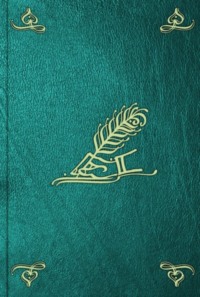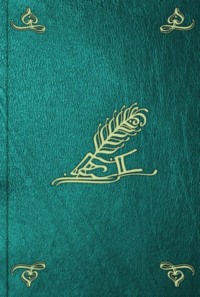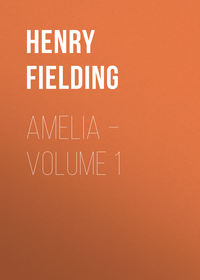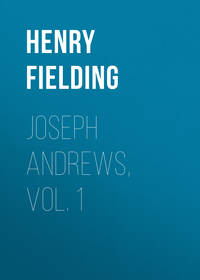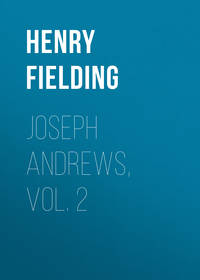 полная версия
полная версияThe History of the Life of the Late Mr. Jonathan Wild the Great
Friendly being one day present while Heartfree was, with tears in his eyes, embracing his eldest daughter, and lamenting the hard fate to which he feared he should be obliged to leave her, spoke to him thus: "I have long observed with admiration the magnanimity with which you go through your own misfortunes, and the steady countenance with which you look on death. I have observed that all your agonies arise from the thoughts of parting with your children, and of leaving them in a distrest condition; now, though I hope all your fears will prove ill grounded, yet, that I may relieve you as much as possible from them, be assured that, as nothing can give me more real misery than to observe so tender and loving a concern in a master, to whose goodness I owe so many obligations, and whom I so sincerely love, so nothing can afford me equal pleasure with my contributing to lessen or to remove it. Be convinced, therefore, if you can place any confidence in my promise, that I will employ my little fortune, which you know to be not entirely inconsiderable, in the support of this your little family. Should any misfortune, which I pray Heaven avert, happen to you before you have better provided for these little ones, I will be myself their father, nor shall either of them ever know distress if it be any way in my power to prevent it. Your younger daughter I will provide for, and as for my little prattler, your elder, as I never yet thought of any woman for a wife, I will receive her as such at your hands; nor will I ever relinquish her for another." Heartfree flew to his friend, and embraced him with raptures of acknowledgment. He vowed to him that he had eased every anxious thought of his mind but one, and that he must carry with him out of the world. "O Friendly!" cried he, "it is my concern for that best of women, whom I hate myself for having ever censured in my opinion. O Friendly! thou didst know her goodness; yet, sure, her perfect character none but myself was ever acquainted with. She had every perfection, both of mind and body, which Heaven hath indulged to her whole sex, and possessed all in a higher excellence than nature ever indulged to another in any single virtue. Can I bear the loss of such a woman? Can I bear the apprehensions of what mischiefs that villain may have done to her, of which death is perhaps the lightest?" Friendly gently interrupted him as soon as he saw any opportunity, endeavouring to comfort him on this head likewise, by magnifying every circumstance which could possibly afford any hopes of his seeing her again.
By this kind of behaviour, in which the young man exemplified so uncommon an height of friendship, he had soon obtained in the castle the character of as odd and silly a fellow as his master. Indeed they were both the byword, laughing-stock, and contempt of the whole place.
The sessions now came on at the Old Bailey. The grand jury at Hicks's-hall had found the bill of indictment against Heartfree, and on the second day of the session he was brought to his trial; where, notwithstanding the utmost efforts of Friendly and the honest old female servant, the circumstances of the fact corroborating the evidence of Fireblood, as well as that of Wild, who counterfeited the most artful reluctance at appearing against his old friend Heartfree, the jury found the prisoner guilty.
Wild had now accomplished his scheme; for as to remained, it was certainly unavoidable, seeing Heartfree was entirely void of interest with the and was besides convicted on a statute the infringers of which could hope no pardon.
The catastrophe to which our hero had reduced this wretch was so wonderful an effort of greatness, that it probably made Fortune envious of her own darling; but whether it was from this envy, or only from that known inconstancy and weakness so often and judiciously remarked in that lady's temper, who frequently lifts men to the summit of human greatness, only
ut lapsu graviore ruant;
certain it is, she now began to meditate mischief against Wild, who seems to have come to that period at which all heroes have arrived, and which she was resolved they never should transcend. In short, there seems to be a certain measure of mischief and iniquity which every great man is to fill up, and then Fortune looks on him of no more use than a silkworm whose bottom is spun, and deserts him. Mr. Blueskin was convicted the same day of robbery, by our hero, an unkindness which, though he had drawn on himself, and necessitated him to, he took greatly amiss: as Wild, therefore, was standing near him, with that disregard and indifference which great men are too carelessly inclined to have for those whom they have ruined, Blueskin, privily drawing a knife, thrust the same into the body of our hero with such violence, that all who saw it concluded he had done his business. And, indeed, had not fortune, not so much out of love to our hero as from a fixed resolution to accomplish a certain purpose, of which we have formerly given a hint, carefully placed his guts out of the way, he must have fallen a sacrifice to the wrath of his enemy, which, as he afterwards said, he did not deserve; for, had he been contented to have robbed and only submitted to give him the booty, he might have still continued safe and unimpeached in the gang; but, so it was, that the knife, missing noble parts (the noblest of many) the guts, perforated only the hollow of his belly, and caused no other harm than an immoderate effusion of blood, of which, though it at present weakened him, he soon after recovered.
This accident, however, was in the end attended with worse consequences: for, as very few people (those greatest of all men, absolute princes excepted) attempt to cut the thread of human life, like the fetal sisters, merely out of wantonness and for their diversion, but rather by so doing propose to themselves the acquisition of some future good, or the avenging some past evil; and as the former of these motives did not appear probable, it put inquisitive persons on examining into the latter. Now, as the vast schemes of Wild, when they were discovered, however great in their nature, seemed to some persons, like the projects of most other such persons, rather to be calculated for the glory of the great man himself than to redound to the general good of society, designs began to be laid by several of those who thought it principally their duty to put a stop to the future progress of our hero; and a learned judge particularly, a great enemy to this kind of greatness, procured a clause in an Act of Parliament a trap for Wild, which he soon after fell into. By this law it was made capital in a prig to steal with the hands of other people. A law so plainly calculated for the destruction of all priggish greatness, that it was indeed impossible for our hero to avoid it.
CHAPTER TWO
A SHORT HINT CONCERNING POPULAR INGRATITUDE. MR. WILD'S ARRIVAL IN THE CASTLE, WITH OTHER OCCURRENCES TO BE FOUND IN NO OTHER HISTORYIf we had any leisure we would here digress a little on that ingratitude which so many writers have observed to spring up in the people in all free governments towards their great men; who, while they have been consulting the good of the public, by raising their own greatness, in which the whole body (as the kingdom of France thinks itself in the glory of their grand monarch) was so deeply concerned, have been sometimes sacrificed by those very people for whose glory the said great men were so industriously at work: and this from a foolish zeal for a certain ridiculous imaginary thing called liberty, to which great men are observed to have a great animosity.
This law had been promulgated a very little time when Mr. Wild, having received from some dutiful members of the gang a valuable piece of goods, did, for a consideration somewhat short of its original price, re-convey it to the right owner; for which fact, being ungratefully informed against by the said owner, he was surprized in his own house, and, being overpowered by numbers, was hurried before a magistrate, and by him committed to that castle, which, suitable as it is to greatness, we do not chuse to name too often in our history, and where many great men at this time happened to be assembled.
The governor, or, as the law more honourably calls him, keeper of this castle, was Mr. Wild's old friend and acquaintance. This made the latter greatly satisfied with the place of his confinement, as he promised himself not only a kind reception and handsome accommodation there, but even to obtain his liberty from him if he thought it necessary to desire it: but, alas! he was deceived; his old friend knew him no longer, and refused to see him, and the lieutenant-governor insisted on as high garnish for fetters, and as exorbitant a price for lodging, as if he had had a fine gentleman in custody for murder, or any other genteel crime.
To confess a melancholy truth, it is a circumstance much to be lamented, that there is no absolute dependence on the friendship of great men; an observation which hath been frequently made by those who have lived in courts, or in Newgate, or in any other place set apart for the habitation of such persons.
The second day of his confinement he was greatly surprized at receiving a visit from his wife; and more so, when, instead of a countenance ready to insult him, the only motive to which he could ascribe her presence, he saw the tears trickling down her lovely cheeks. He embraced her with the utmost marks of affection, and declared he could hardly regret his confinement, since it had produced such an instance of the happiness he enjoyed in her, whose fidelity to him on this occasion would, be believed, make him the envy of most husbands, even in Newgate. He then begged her to dry her eyes, and be comforted; for that matters might go better with him than she expected. "No, no," says she, "I am certain you would be found guilty. DEATH. I knew what it would always come to. I told you it was impossible to carry on such a trade long; but you would not be advised, and now you see the consequence-now you repent when it is too late. All the comfort I shall have when you are NUBBED [Footnote: The cant word for hanging.] is, that I gave you a good advice. If you had always gone out by yourself, as I would have had you, you might have robbed on to the end of the chapter; but you was wiser than all the world, or rather lazier, and see what your laziness is come to – to the CHEAT, [Footnote: The gallows.] for thither you will go now, that's infallible. And a just judgment on you for following your headstrong will; I am the only person to be pitied; poor I, who shall be scandalised for your fault. THERE GOES SHE WHOSE HUSBAND WAS HANGED: methinks I hear them crying so already." At which words she burst into tears. He could not then forbear chiding her for this unnecessary concern on his account, and begged her not to trouble him any more. She answered with some spirit, "On your account, and be d – d to you! No, if the old cull of a justice had not sent me hither, I believe it would have been long enough before I should have come hither to see after you; d – n me, I am committed for the FILINGLAY, [Footnote: Picking pockets.] man, and we shall be both nubbed together. 'I faith, my dear, it almost makes me amends for being nubbed myself, to have the pleasure of seeing thee nubbed too." "Indeed, my dear," answered Wild, "it is what I have long wished for thee; but I do not desire to bear thee company, and I have still hopes to have the pleasure of seeing you go without me; at least I will have the pleasure to be rid of you now." And so saying, he seized her by the waist, and with strong arm flung her out of the room; but not before she had with her nails left a bloody memorial on his cheek: and thus this fond couple parted.
Wild had scarce recovered himself from the uneasiness into which this unwelcome visit, proceeding from the disagreeable fondness of his wife, had thrown him, than the faithful Achates appeared. The presence of this youth was indeed a cordial to his spirits. He received him with open arms, and expressed the utmost satisfaction in the fidelity of his friendship, which so far exceeded the fashion of the times, and said many things which we have forgot on the occasion; but we remember they all tended to the praise of Fireblood, whose modesty, at length, put a stop to the torrent of compliments, by asserting he had done no more than his duty, and that he should have detested himself could he have forsaken his friend in his adversity; and, after many protestations that he came the moment he heard of his misfortune, he asked him if he could be of any service. Wild answered, since he had so kindly proposed that question, he must say he should be obliged to him if he could lend him a few guineas; for that he was very seedy. Fireblood replied that he was greatly unhappy in not having it then in his power, adding many hearty oaths that he had not a farthing of money in his pocket, which was, indeed, strictly true; for he had only a bank-note, which he had that evening purloined from a gentleman in the playhouse passage. He then asked for his wife, to whom, to speak truly, the visit was intended, her confinement being the misfortune of which he had just heard; for, as for that of Mr. Wild himself, he had known it from the first minute, without ever intending to trouble him with his company. Being informed therefore of the visit which had lately happened, he reproved Wild for his cruel treatment of that good creature; then, taking as sudden a leave as he civilly could of the gentleman, he hastened to comfort his lady, who received him with great kindness.
CHAPTER THREE
CURIOUS ANECDOTES RELATING TO THE HISTORY OF NEWGATEThere resided in the castle at the same time with Mr. Wild one Roger Johnson, a very GREAT MAN, who had long been at the head of all the prigs in Newgate, and had raised contributions on them. He examined into the nature of their defence, procured and instructed their evidence, and made himself, at least in their opinion, so necessary to them, that the whole fate of Newgate seemed entirely to depend upon him.
Wild had not been long in confinement before he began to oppose this man. He represented him to the prigs as a fellow who, under the plausible pretence of assisting their causes, was in reality undermining THE LIBERTIES OF NEWGATE. He at first threw out certain sly hints and insinuations; but, having by degrees formed a party against Roger, he one day assembled them together, and spoke to them in the following florid manner:
"Friends and fellow-citizens, – The cause which I am to mention to you this day is of such mighty importance, that when I consider my own small abilities, I tremble with an apprehension lest your safety may be rendered precarious by the weakness of him who hath undertaken to represent to you your danger. Gentlemen, the liberty of Newgate is at stake; your privileges have been long undermined, and are now openly violated by one man; by one who hath engrossed to himself the whole conduct of your trials, under colour of which he exacts what contributions on you he pleases; but are those sums appropriated to the uses for which they are raised? Your frequent convictions at the Old Bailey, those depredations of justice, must too sensibly and sorely demonstrate the contrary. What evidence doth he ever produce for the prisoner which the prisoner himself could not have provided, and often better instructed? How many noble youths have there been lost when a single alibi would have saved them! Should I be silent, nay, could your own injuries want a tongue to remonstrate, the very breath which by his neglect hath been stopped at the cheat would cry out loudly against him. Nor is the exorbitancy of his plunders visible only in the dreadful consequences it hath produced to the prigs, nor glares it only in the miseries brought on them: it blazes forth in the more desirable effects it hath wrought for himself, in the rich perquisites acquired by it: witness that silk nightgown, that robe of shame, which, to his eternal dishonour, he publicly wears; that gown which I will not scruple to call the winding-sheet of the liberties of Newgate. Is there a prig who hath the interest and honour of Newgate so little at heart that he can refrain from blushing when he beholds that trophy, purchased with the breath of so many prigs? Nor is this all. His waistcoat embroidered with silk, and his velvet cap, bought with the same price, are ensigns of the same disgrace. Some would think the rags which covered his nakedness when first he was committed hither well exchanged for these gaudy trappings; but in my eye no exchange can be profitable when dishonour is the condition. If, therefore, Newgate – " Here the only copy which we could procure of this speech breaks off abruptly; however, we can assure the reader, from very authentic information, that he concluded with advising the prigs to put their affairs into other hands. After which, one of his party, as had been before concerted, in a very long speech recommended him (Wild himself) to their choice.
Newgate was divided into parties on this occasion, the prigs on each side representing their chief or great man to be the only person by whom the affairs of Newgate could be managed with safety and advantage. The prigs had indeed very incompatible interests; for, whereas the supporters of Johnson, who was in possession of the plunder of Newgate, were admitted to some share under their leader, so the abettors of Wild had, on his promotion, the same views of dividing some part of the spoil among themselves. It is no wonder, therefore, they were both so warm on each side. What may seem more remarkable was, that the debtors, who were entirely unconcerned in the dispute, and who were the destined plunder of both parties, should interest themselves with the utmost violence, some on behalf of Wild, and others in favour of Johnson. So that all Newgate resounded with WILD for ever, JOHNSON for ever. And the poor debtors re-echoed THE LIBERTIES OF NEWGATE, which, in the cant language, signifies plunder, as loudly as the thieves themselves. In short, such quarrels and animosities happened between them, that they seemed rather the people of two countries long at war with each other than the inhabitants of the same castle.
Wild's party at length prevailed, and he succeeded to the place and power of Johnson, whom he presently stripped of all his finery; but, when it was proposed that he should sell it and divide the money for the good of the whole, he waved that motion, saying it was not yet time, that he should find a better opportunity, that the cloathes wanted cleaning, with many other pretences, and within two days, to the surprize of many, he appeared in them himself; for which he vouchsafed no other apology than that they fitted him much better than they did Johnson, and that they became him in a much more elegant manner.
This behaviour of Wild greatly incensed the debtors, particularly those by whose means he had been promoted. They grumbled extremely, and vented great indignation against Wild; when one day a very grave man, and one of much authority among them, bespake them as follows:
"Nothing sure can be more justly ridiculous than the conduct of those who should lay the lamb in the wolfs way, and then should lament his being devoured. What a wolf is in a sheep-fold, a great man is in society. Now, when one wolf is in possession of a sheep- fold, how little would it avail the simple flock to expel him and place another in his stead! Of the same benefit to us is the overthrowing one prig in favour of another. And for what other advantage was your struggle? Did you not all know that Wild and his followers were prigs, as well as Johnson and his? What then could the contention be among such but that which you have now discovered it to have been? Perhaps some would say, Is it then our duty tamely to submit to the rapine of the prig who now plunders us for fear of an exchange? Surely no: but I answer, It is better to shake the plunder off than to exchange the plunderer. And by what means can we effect this but by a total change in our manners? Every prig is a slave. His own priggish desires, which enslave him, themselves betray him to the tyranny of others. To preserve, therefore, the liberty of Newgate is to change the manners of Newgate. Let us, therefore, who are confined here for debt only, separate ourselves entirely from the prigs; neither drink with them nor converse with them. Let us at the same time separate ourselves farther from priggism itself. Instead of being ready, on every opportunity, to pillage each other, let us be content with our honest share of the common bounty, and with the acquisition of our own industry. When we separate from the prigs, let us enter into a closer alliance with one another. Let us consider ourselves all as members of one community, to the public good of which we are to sacrifice our private views; not to give up the interest of the whole for every little pleasure or profit which shall accrue to ourselves. Liberty is consistent with no degree of honesty inferior to this, and the community where this abounds no prig will have the impudence or audaciousness to endeavour to enslave; or if he should, his own destruction would be the only consequence of his attempt. But while one man pursues his ambition, another his interest, another his safety; while one hath a roguery (a priggism they here call it) to commit, and another a roguery to defend; they must naturally fly to the favour and protection of those who have power to give them what they desire, and to defend them from what they fear; nay, in this view it becomes their interest to promote this power in their patrons. Now, gentlemen, when we are no longer prigs, we shall no longer have these fears or these desires. What remains, therefore, for us but to resolve bravely to lay aside our priggism, our roguery, in plainer words, and preserve our liberty, or to give up the latter in the preservation and preference of the former?"
This speech was received with much applause; however, Wild continued as before to levy contributions among the prisoners, to apply the garnish to his own use, and to strut openly in the ornaments which he had stripped from Johnson. To speak sincerely, there was more bravado than real use or advantage in these trappings. As for the nightgown, its outside indeed made a glittering tinsel appearance, but it kept him not warm, nor could the finery of it do him much honour, since every one knew it did not properly belong to him; as to the waistcoat, it fitted him very ill, being infinitely too big for him; and the cap was so heavy that it made his head ache. Thus these cloathes, which perhaps (as they presented the idea of their misery more sensibly to the people's eyes) brought him more envy, hatred, and detraction, than all his deeper impositions and more real advantages, afforded very little use or honour to the wearer; nay, could scarce serve to amuse his own vanity when this was cool enough to reflect with the least seriousness. And, should I speak in the language of a man who estimated human happiness without regard to that greatness, which we have so laboriously endeavoured to paint in this history, it is probable he never took (i.e. robbed the prisoners of) a shilling, which he himself did not pay too dear for.
CHAPTER FOUR
THE DEAD-WARRANT ARRIVES FOR HEARTFREE; ON WHICH OCCASION WILD BETRAYS SOME HUMAN WEAKNESSThe dead-warrant, as it is called, now came down to Newgate for the execution of Heartfree among the rest of the prisoners. And here the reader must excuse us, who profess to draw natural, not perfect characters, and to record the truths of history, not the extravagances of romance, while we relate a weakness in Wild of which we are ourselves ashamed, and which we would willingly have concealed, could we have preserved at the same time that strict attachment to truth and impartiality, which we have professed in recording the annals of this great man. Know then, reader, that this dead-warrant did not affect Heartfree, who was to suffer a shameful death by it, with half the concern it gave Wild, who had been the occasion of it. He had been a little struck the day before on seeing the children carried away in tears from their father. This sight brought the remembrance of some slight injuries he had done the father to his mind, which he endeavoured as much as possible to obliterate; but, when one of the keepers (I should say lieutenants of the castle) repeated Heartfree's name among those of the malefactors who were to suffer within a few days, the blood forsook his countenance, and in a cold still stream moved heavily to his heart, which had scarce strength enough left to return it through his veins. In short, his body so visibly demonstrated the pangs of his mind, that to escape observation he retired to his room, where he sullenly gave vent to such bitter agonies, that even the injured Heartfree, had not the apprehension of what his wife had suffered shut every avenue of compassion, would have pitied him.


